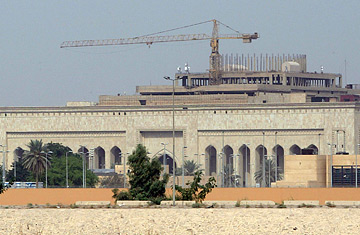
The U.S. Embassy under construction in Baghdad, October 2007.
On Oct. 26, the State Department e-mailed 250 diplomats and told them that they might be ordered, whether they like it or not, to fill about 50 positions in Iraq next year. It was no secret the U.S. was considering compulsory Iraq service for its diplomatic corps, but the e-mails sparked outrage nevertheless.
At a State department "town hall" meeting on Wednesday, one participant, veteran diplomat Jack Croddy, pointed out the risks of injury and death faced by American diplomats. But he hit closer to the heart of the matter when he told the director general of the Foreign Service, who was leading the meeting, "It's one thing if someone believes in what's going on over there and volunteers, but it's another thing to send someone over there on a forced assignment." On Friday, Secretary of State Condoleezza Rice, who was traveling, issued a statement saying, "We must go forward with the identification of officers to serve, should it prove necessary to direct assignments. Should others step forward, as some already have, we will fill these new jobs as we have before — with volunteers. However, regardless of how the jobs may be filled, they must be filled."
Iraq is certainly a dangerous place for representatives of the American government. Combat troops are far and away the most likely to be killed or wounded, but diplomats face risks as well. The Green Zone, the heavily fortified home of the U.S. Embassy and the Iraqi government, has been a target for insurgent and militia rocket attacks for years. As the war drags on, the intensity and accuracy of those attacks has increased. Makeshift concrete bunkers are now scattered across the Green Zone, and diplomats are periodically required to don helmets and flak vests when they venture outdoors even within the Green Zone compound. Outside the Green Zone, diplomatic convoys are prime targets for insurgents, militiamen and freelance kidnappers.
The most demoralizing aspect of the violence may not be the physical risk, but rather the isolation and sense of futility the violence engenders. Most diplomats leave the Green Zone only rarely, and never simply to socialize with ordinary Iraqis or explore the city. Traveling around Baghdad for the fun of it always carried some risk for Americans, but it was at least possible in 2003 and into 2004. Now the idea is outlandish. State Department employees travel under heavy guard, which only serves to further isolate them from the populace (the Blackwater guards accused by the Iraqi government of an unprovoked attack on Iraqi civilians were guarding a diplomatic convoy). The average diplomat's feel for Baghdad and the rest of Iraq is gleaned mostly from the U.S. Embassy's Iraqi employees, who themselves live in fear of being targeted as "collaborators."
The U.S. government can address the physical risks of working in Iraq by restricting travel, beefing up security and taking steps to counter rocket attacks. Its massive new embassy complex — set to open in a few months — comes equipped with hundreds of bomb-resistant apartments for its staff, a ventilation system designed to minimize the impact of a chemical weapons attack, and other safeguards more appropriate for a high-tech fortress than a center of diplomacy. But Americans don't join the Foreign Service to hunker down in a bomb-proof bunker, cut off not only from their own families but also from the people and the culture of their host country.
Most discouraging of all, the danger and discomfort do not seem to be in service of a successful strategy. Croddy, the veteran diplomat, implied that the shortage of volunteers was a function of diplomats not believing in the American mission in Iraq. It's a fair point. Violence has dropped in recent months, but there has been little substantive progress on key issues from disarming Shi'ite militias to deciding how to distribute the nation's oil revenue. As the Bush Administration ratchets up its rhetoric against Iran it is American diplomats who must deal personally with Shi'ite politicians, who have closer ties to Tehran than to Washington.
No wonder, then, that the State Department may resort to a draft to fill its Baghdad roster. The risk to life and limb is real. But the greater worry is that the risks and hardships will be in the service of a cause that is not only frustrating but potentially futile.
